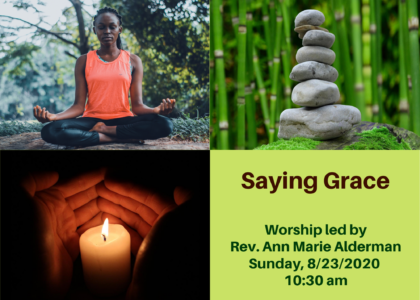Please visit our YouTube channel to watch Rev. Ann Marie’s video recording of this reflection.
You may have read my newsletter article this month where I admitted that even though I’m a member of the clergy, I don’t necessarily have a spiritual practice.
I don’t pray very often. I don’t meditate. I don’t do yoga. I only occasionally write in a journal.
So when the subject comes up, I have to think about what I do, or what I have done that might qualify as a spiritual practice.
I offered, in my newsletter article, that when I was a child, my family was in the habit of saying a blessing or saying grace at dinner time. We regularly thanked God for the evening meal. Now I often thank not a god, but the real people who provide and prepare the food I consume. On a regular basis, only one of the many people involved in getting food to my table really hears me. That is my wife, who is usually my family’s meal preparer. She is pleased to hear the thanks, and perhaps more importantly, happy that I am modeling a way of expressing gratitude for our children.
A regular, routine way of expressing gratitude likely does serve as a spiritual practice. So, I guess I can check yes, if asked—yes, I do have a spiritual practice.
Saying grace does help me remember that a meal is more than an exchange of money for a consumable product. That is a good thing. But I wonder if it is enough.
Honestly, I was going to use this reflection, this sermon today, to help you see there are likely many things that you already do that are spiritual practices.
I was all set up to help you see that anything that you do on a routine basis, which provides an intentional acknowledgement of connection with that which is beyond the immediate, could be considered a spiritual practice.
Then this past week happened. The RNC, Hurricane Laura, the shooting of Jacob Blake, the teen with a long gun, the 57th March on Washington.
You know, I have read and I have heard from those who have a spiritual practice that they do what they do because it improves their life in some significant way. I needed more than saying grace this past week.
Once again, I covered my feelings of despair with anger. I wasn’t even aware of how sad I felt, how disappointed with the lies and grandiosity, the violence, until I shouted at the nearest human, accusing them of something they hadn’t done.
Perhaps, we could also consider that the purpose, the point of engaging in a spiritual practice is to orient (or reorient) ourselves in a way that is calming. To do whatever practice we choose to engage in often enough that we can claim some semblance of spiritual health.
Right now, I think that at least for me, returning to a place of calm when rage overtakes me, building a reservoir of peace that will bring some balance to the storm, is what I need.
I need a place where I can remember how it feels to trust, to feel a deep-seated hope that the planet is going to continue to be habitable in a manner conducive to human well-being. That the extreme polarity in the political messaging that we have heard in the last several weeks may be the sound of the dissolution of a nation that needs to be and is about to be reborn. I need a place to lay down the guilt I feel for the suffering my privilege has caused and continues to cause.
I could go on.
I could go numb.
I could continue to be angry, hurting my family with my rage.
Or I could choose a spiritual practice that makes a better warrior for the long haul.
“We are what we practice,” says Jewish writer Avram Davis. “If we become angry a lot, then essentially we are practicing anger. And we get quite good at it. Conversely, if we practice being joyful, then a joyful person is what we become.”
The truth is we practice all kinds of things all the time. What we do unconsciously, routinely, is what creates and sustains who we are, how we move through this world.
The decision to do a spiritual practice ought to be intentional, and the intention needs to include the recognition that whatever you have been practicing is not bringing you peace, or calm.
Whatever you may have been practicing may be keeping you reactive, angry, numb.
Joanna Macy says, “When you look at what is happening to our world, it becomes clear that unless you have some roots in a spiritual practice that holds life sacred and encourages joyful communion with all your fellow beings, facing the enormous challenges ahead becomes nearly impossible.”
I need to know that I have access to a reservoir of calm, of joy, of trust, to face the enormous challenges.
I may be clergy, and being at church may be my job. But I need to be here.
I need the practice of engaging in community with those who want to be together, who enjoy being together… who trust that we, with others to whom we belong, can and are making a difference.
If you appreciated this reflection, please text to give or visit our Give Now page to support the UUCSH Share the Plate efforts to assist those in need.

